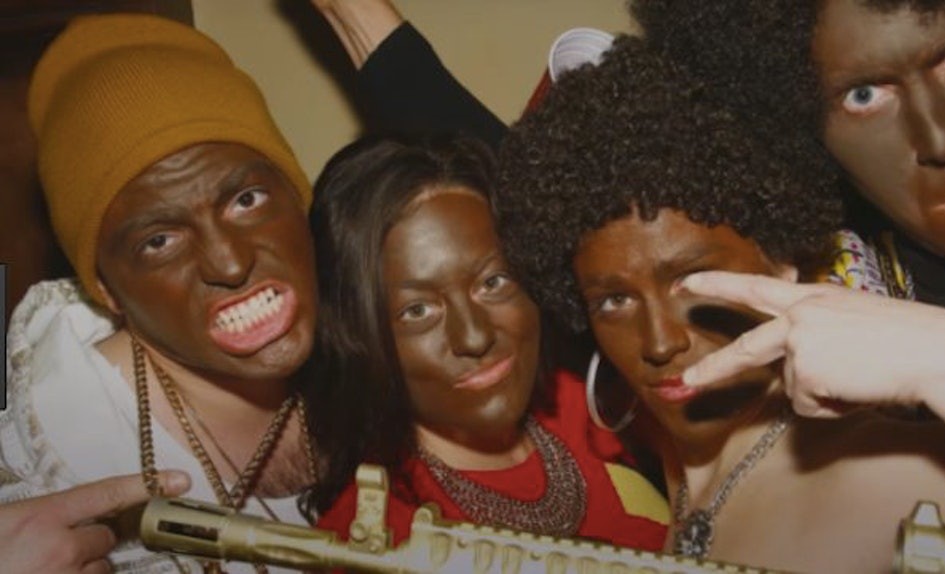
Is Blackface Ok?
How do you feel about Blackface? Do you know what it is? Blackface is the negative portrayal of Black people by White people who darken their skin, exaggerate the size and color of their lips, wear clown-like afro wigs, and act and/or speak stereotypically. We’ve often seen White people dress in Blackface for Holloween, in films, or on TV shows. While most of us take offense to Blackface, some people, like NBC’s Megyn Kelly, view it as paying homage to Black people. But is Blackface paying homage to Black people or is it White privilege?History
It’s important to know one’s history. When you know your history, you can avoid making the same mistakes that were made in the past. Blackface–like slavery, lynching, de jure and de facto racism, institutionalized racism, etc.–is an abhorrent fact of history. However, since Black history is taught separate from world history, some people believe that wearing Blackface is permissible. For example, if one wears Blackface during Halloween, that should somehow negate history and justify their disrespect.The Virginia Minstrels
In the early 1840s, the White bigots, Dan Emmett and Frank Bower, met while performing with the Cincinnati Circus Company. Under Emmett’s direction, the duo separated from the circus in order to pursue a new act. They both dressed in Blackface and performed tunes, like Dixie, Camptown Races, and Oh Susanna. By 1842, the duo was billed as ‘the renowned Ethiopian Minstrel and his Little Darkie Ariel.’ That same year, Emmett and Bower teamed up with two other fellow Blackface-performing bigots. They became the Virginia Minstrels, the first minstrel show.
The Jazz Singer
The Virginia Minstrels laid the foundation for many other minstrel performers. Some of the most famous minstrels that you may be familiar with were Jim Crow, Zip Coon, and Tambo. Perhaps the most famous minstrel is Warner Bros’ The Jazz Singer. In this film, White actor Al Jolson dressed in Blackface and stereotypically, erroneously, and offensively, depicted a Black struggling jazz musician. [caption id="attachment_8797" align="aligncenter" width="652"] Al Jolsen in The Jazz Singer.[/caption]
Al Jolsen in The Jazz Singer.[/caption]
Modern Blackface
Of course, the history of Blackface does not end there. Contrary to popular belief, the people of Earth did not start holding hands and singing Kum Ba Yah in unison after the Civil Rights Movement ended. In fact, race relations have only progressed linearly. Racial slurs, derogatory remarks, and offensive characterizations have become normalized because society has desensitized itself to these offenses by remaining ignorant to our collective history. We as a community have allowed White actors to wear Blackface and offend us in other ways without stirring up too much of a fuss. In 2008, the film Tropic Thunder was released starring Ben Stiller, Jack Black, and Robert Downey, Jr. For the duration of the film, Downey played an actor who was playing a Black man in another film. He spoke and acted stereotypically, displaying a modern-day minstrel show. [caption id="attachment_8798" align="aligncenter" width="652"] Robert Downey, Jr. in Iron Man (left) and in Tropic Thunder (right)[/caption]
In 2016, Zoe Saldana starred in the film Nina. The film, which outlined the life of the illustrious Nina Simone, required Saldana to darken her skin. Sure, Saldana is Black but with all of the darker Black actresses in Hollywood, it would’ve behooved the production team to simply cast one them. Simone was essentially portrayed as a minstrel.
[caption id="attachment_8799" align="aligncenter" width="654"]
Robert Downey, Jr. in Iron Man (left) and in Tropic Thunder (right)[/caption]
In 2016, Zoe Saldana starred in the film Nina. The film, which outlined the life of the illustrious Nina Simone, required Saldana to darken her skin. Sure, Saldana is Black but with all of the darker Black actresses in Hollywood, it would’ve behooved the production team to simply cast one them. Simone was essentially portrayed as a minstrel.
[caption id="attachment_8799" align="aligncenter" width="654"] Zoe Saldana in Nina (left) and Nina Simone (right).[/caption]
And just this year, in the first episode of season 10 of The Real Housewives of New York, Luann de Lesseps darkened her skin and wore a ridiculous afro wig in order to portray Diana Ross for Halloween. Additionally, in several European countries, it’s customary to dress in Blackface for the equivalent of Christmas. Look up Zwarte Piet and you’ll see what I mean. We can even discuss non-Black criminals using Blackface to rob or commit other crimes but I digress.
Zoe Saldana in Nina (left) and Nina Simone (right).[/caption]
And just this year, in the first episode of season 10 of The Real Housewives of New York, Luann de Lesseps darkened her skin and wore a ridiculous afro wig in order to portray Diana Ross for Halloween. Additionally, in several European countries, it’s customary to dress in Blackface for the equivalent of Christmas. Look up Zwarte Piet and you’ll see what I mean. We can even discuss non-Black criminals using Blackface to rob or commit other crimes but I digress.


Homage or Privilege?
Knowing the history of Blackface, you’d think people wouldn’t view it as an homage to Black people. But Megyn Kelly, an NBC show host, along with countless others, don’t see where Blackface is offensive. Kelly recently defended the use of Blackface particularly during Halloween. Many White people are under the impression that anything goes when it comes to Halloween. It’s not ok to dress in Blackface nor is it ok to dress in traditional garb that mimics a culture that is not your own. Skin color and traditional clothing are not costumes. Disrespecting someone’s heritage is not paying homage to them but White privilege would have you believe otherwise. Hopefully, we won’t have to deal with Kelly’s racist comments on NBC anymore. They’re renegotiating her contract now and she may be let go from the network. I’m sure Fox will pick her up, though. [caption id="attachment_8804" align="aligncenter" width="683"] Megyn Kelly, the NBC host who openly supports Blackface.[/caption]]]>
Megyn Kelly, the NBC host who openly supports Blackface.[/caption]]]>








